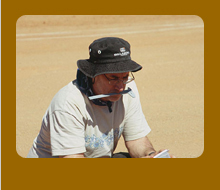
 |
|
Opportunities for participation in fieldwork The current setup of the field research on Chersobius boulengeri in South Africa allows participation of several volunteers each year. Volunteers help to find tortoises in the field, receive training in taking recordings, and eventually gather much of the data themselves. They will also be trained to perform radio telemetry. Dates for the upcoming fieldwork are 10 February until 19 March 2020. Within this period, volunteers can participate for periods from 2 to 5 weeks. Potential volunteers must realise that fieldwork is not quite the same as regular holidays. The entire period will be spent in a relatively small area and days can be long and hot. An adequate physical shape is required, as the study area is situated on a rocky hill. The nights will be spent in a lodge (single en suite rooms). Facilities are good and there will be time to learn more about the local flora and fauna. In general, fieldwork periods are a great experience to learn about the country, its people, flora and fauna, and to have a good time working together in an international team of tortoise enthusiasts. Click here for some fieldwork impressions and here for an introductory movie clip about the C. boulengeri fieldwork. The primary language during the fieldwork will be English. Volunteers and students will cover expenses for their flight and food themselves, and they will share national travel expenses (travelling by car) and expenses for accommodation. Accommodation, food and petrol are cheap in South Africa, compared to European standards. It is impossible to give an exact amount, but as an indication, the total costs (excluding flights) should be below € 25-30 per person per day. Dwarf Tortoise Conservation will cover all the costs for research materials and equipment and may waive some of the other costs if project funding permits. If you are interested to participate in C. boulengeri fieldwork, please send us a message providing details about yourself and your background. In case you have additional questions, please also do not hesitate to contact Dwarf Tortoise Conservation. |